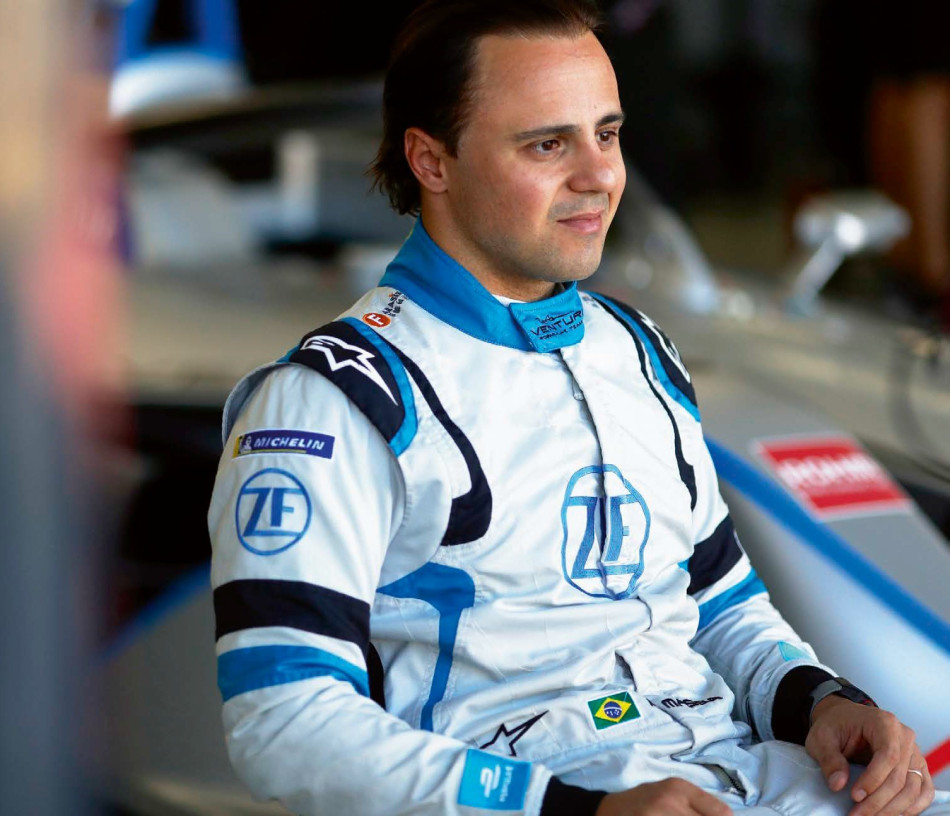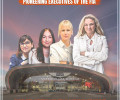AUTO - THE PURSUIT OF PURITY
After a hugely successful Formula 1 career, grand prix great Felipe Massa has embarked on two new challenges – leading the development of motor sport’s entry-level discipline as President of the FIA’s International Karting Commission and racing in the future-focused Formula E Championship. Both, he insists, are defined by the same motivation – the joy of competition.

Take a quick straw pole among the ranks of drivers from across the racing disciplines regarding their favourite form of motor sport and the overwhelming majority will come down in favour of one – go-karting. And almost inevitably the reasoning behind that choice focuses on a few key words: purity, competitiveness… joy.
It’s no different for Felipe Massa. The Brazilian ex-Formula 1 driver and current Formula E racer might be a veteran of 269 grand prix starts, with 11 wins and 41 podium finishes to his credit across a 16-year career, but the word ‘karting’ still has the power to make him break out in a broad grin.
“I started when I was eight years old and I raced karts from eight to 16,” he says. “Before that I had a little motocross bike but I think I was a bit too crazy on that so my father said ‘OK, maybe it’s better on four wheels’. We were living in the countryside, two hours from São Paulo, but he brought me to the city and I did a school in what I guess were mini-buggies and after that I started karting properly.
“The guy running it said I was quite good and so my father bought a kart,” he continues. “My father would put the kart inside the car and I’d sit in it, the go-kart, for two hours and 30 minutes, all the way to São Paulo. That gives you an idea how crazy I was for it. And when I started racing… You know, as a driver, karting is your school; you learn everything from it. When I moved to cars the sequence continued, but in karting you learn order, you get the experience and the mentality you need to have to be a driver. It is a very pure form of competition.”
Massa’s love for karting has endured throughout his career – he still frequently races with his own team in his home country – and following his retirement from grand prix racing at the end of the 2017 season, the former Ferrari driver converted his passion for the discipline into a deeper commitment by taking on the role of President of the FIA’s International Karting Commission.
Since his appointment in December 2017, Massa has attended kart events around the world, sampling the current state of the sport and formulating his own vision for its future. And while he believes there are changes to be made, he is certain that the core spirit of the sport – the purity of competition – is in rude health.
“I see exactly the same feeling I had in the past when I was racing in go-karts,” he says. “When I go to the race tracks I see the reaction of the drivers, I see the reaction of the parents, how they look at me, thinking ‘man, hopefully one day I can be where you are’. The dream is the same for kids now as it always has been.
“However, I see that the difference now is maybe it’s a bit too expensive. OK, that is true of every category, and it was the same when I was young, especially as I didn’t have money, but while the feeling is the same I think we definitely need to reduce the costs and make it even more accessible. Also, we need to make the competitions simpler. It is a very complex sport and sometimes it is hard for kids to know where they should be racing and in what category.”
Massa believes that the process of simplification and cost reduction is already well underway, largely thanks to the introduction of new direct-drive engines, the OK powerplants, in 2016, and the creation of the OK and OK-Junior classes raced at European and world level.
“A few years ago there were so many different categories that even I didn’t understand what was what, but with the introduction of the OK engines things have become a lot clearer,” he says.
“Now you have OK-Junior, which is for kids aged 12-14, the OK category itself, which is 14 years and up, the KZ class which has a gear shift, and then we have KZ2 which is a shifter kart but the category features lot of professional drivers, even drivers my age. Then there are Superkarts, which are very fast, a very different category.
“With the OK categories, the price of the engine is capped at around €2,000, so the costs are being reduced and the categories have already been simplified,” he adds. “I’m quite happy because things are clearer and the OK engine is working really well, so now the target is to push other countries to follow that path.”
GLOBAL REACH
While a vibrant karting scene exists in many countries around the world, Europe remains the sport’s most competitive arena. However, with the success of the OK category, Massa is keen for the model to reach further.
“There are so many countries where karting is not as developed as in the countries we know, so it’s taking time, but I’m sure things are growing in the right way with the idea to raise the profile or implement these categories in different regions. The problem is that sometimes you implement the categories, or there is a strong desire to do so, but they just don’t have the drivers. We need to improve the culture of karting in many countries.”
Part of the commission president’s vision for spreading the popularity of international karting is to take the world championship finals event beyond the sport’s European heartland.
“We need to go to the other countries, in America, South America, Asia,” he says. “We need to go to the important places for growth and we need to understand the how karting is perceived in those regions and what we can bring to them.”
Massa would also like to review the format of the world championships finals, believing that settling the title over a single event results in a competition that due to circumstances may not reward the best driver.
“Why does it have to be a single event? Why can’t we have the world championship decided over several events? I know many world champions, but to be honest some were maybe not supposed to be world champions, but they were lucky because the guy that was leading, his engine broke or they were involved in a collision they did not start “So maybe we could have four events,” he explains. “It’s possible, and in amazing places. I am sure there are countries that are ready to host the event. I don’t think it would require enormous amounts of money – maybe a million and a half and perhaps that could be raised through sponsorship.”
A parallel issue that has arisen in recent times is what might be termed ‘the Verstappen factor’, a culture of all-too-rapid progression from karting to single-seaters, as young racers and their families seek to emulate the stunning, if unusual, progression of drivers such as Max Verstappen.
Massa is aware of the problem and adds that the swift transition to single-seaters is exacerbated by the rising cost of karting competition at international level.
“It’s a very important issue,” he says. “It’s a big thing and it was one of the first things I mentioned to the FIA. We need to be strong on age limits and we need to discuss what else we can do to protect the young.”
“Electric karts are definitely part of the future – not only for the European or world championships, but also for the idea to bring karting to the Olympic Games. That’s a really amazing thing and we are pushing hard for it. It can be possible because with karting, especially electric, it is not so dominated by manufacturers,” he explains.
“However, there is still a lot of development to do, particularly with the batteries, because they are still too heavy. They are much heavier than a regular engine and from a safety point of view we are still some way off. We, as CIK-FIA, can’t accept any risk of a kart flipping and landing on a driver. But I know that there is some amazing work being done on making the batteries lighter, so maybe we will see electric karting at a high level in the not too distant future.”
NEW TERRITORY
Massa’s fascination with the possibilities provided by electric racing extends to his own track activities, and after calling time on his F1 journey, the former Ferrari man is now embarking on a new racing career – in The FIA ABB Formula E Championship.
“I’m very happy to be part of it,” he says. “I wanted to find a championship to race, to do what I love to do, which is racing. I checked DTM and sports cars but for me this is the championship that you can stay with for longer. I’m really interested in Formula E because it’s a new show for the future. Electric cars are going to be part of our DNA and Formula E is how electric cars will race. It is growing so fast. You see that in how many sponsors they are signing, how many manufacturers arear involved. It shows that electric racing is the future.”
In May, Massa joined the Venturi Formula E Team on a three-year deal starting with Season 5 and the debut of the championship’s exciting new Gen 2 cars. That’s a development the rookie FE star feels might help his transition.
“It’s a new car for everyone, one car for the whole race and the mentality of the championship has changed a lot,” he says. “So while a lot things will be similar, it’s quite diffi cult to say who will be in front. It’s a new challenge for the teams and for me that’s a good thing.”
Massa is not the only new blood being injected into Venturi, with the Brazilian’s former colleague at the Williams F1 Team, Susie Wolff, taking the reins at the Formula E squad as team principal.
As such, Massa sees Season 5 as a new start for the Monaco-based squad.
“Venturi has been in Formula E for some time and they have been growing with the sport, but this is definitely like a new beginning. There’s a lot to understand and we need to see how competitive we are over the first races. But testing was good, we were competitive. BMW were very strong, Audi too at the end, so we need to wait and see.”
The F1 veteran admits that jumping from grand prix cars to Formula E has required a change of approach, but he is relishing the challenge.
“It’s a completely different car to drive, so everything you have in your brain from F1 you need to learn again in Formula E,” he says. “There’s a lot less downforce, very different tyres and the power management is very, very different. Also the tracks are completely different. It’s like racing in Monaco every weekend, which is amazing, but it’s quite new for me, so I need to learn. It’s a big challenge but that’s what I love. I’m looking forward to it and who knows what it could lead to in the future.”
It’s that voyage into new territory that has sparked Massa’s interest, in both Formula E and karting. It’s the opportunity to forge new paths, to explore a wide-open landscape that excites, and the only requirement is that the journey comes with competition, pure and simple.

 Facebook
Facebook Twitter
Twitter






